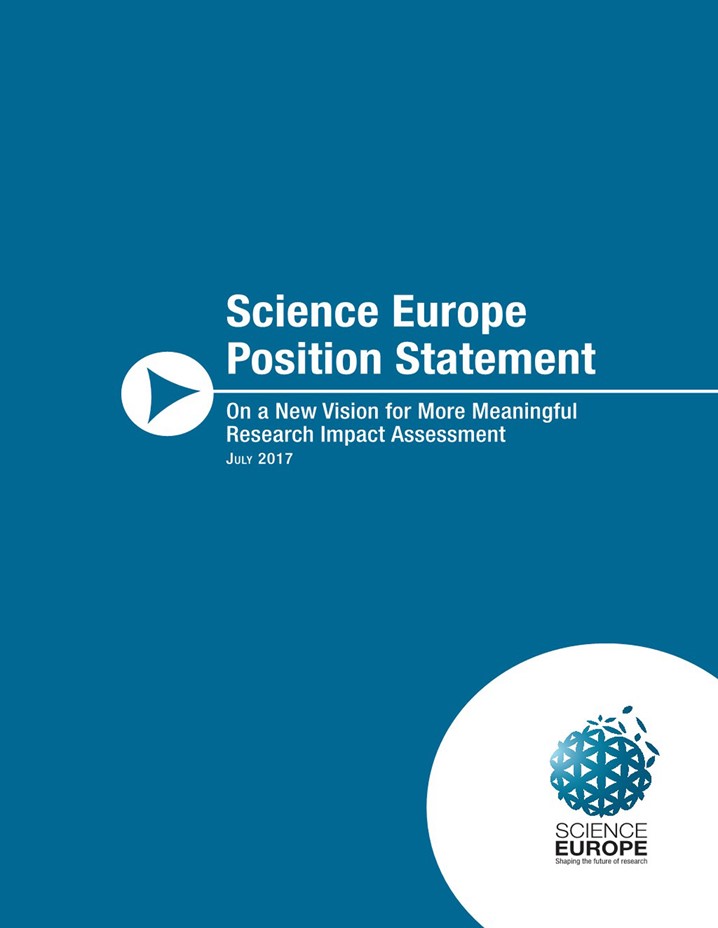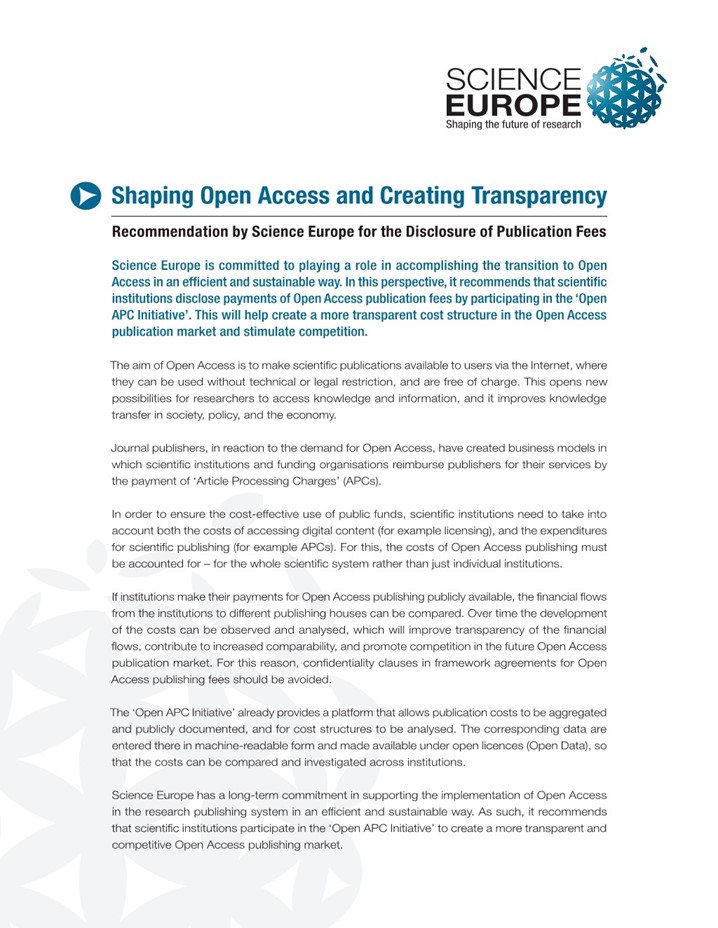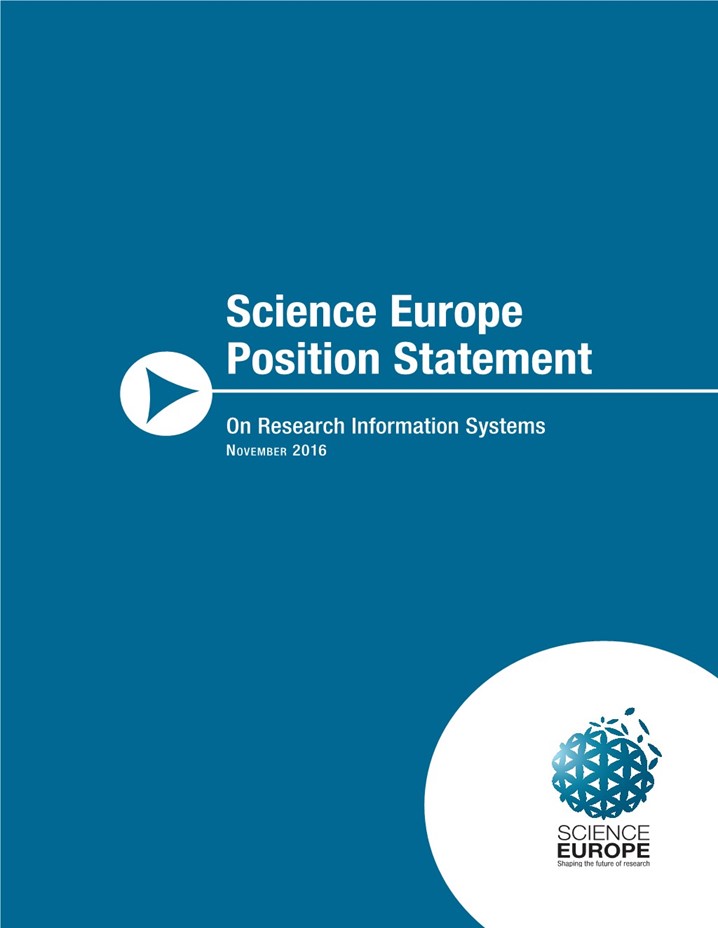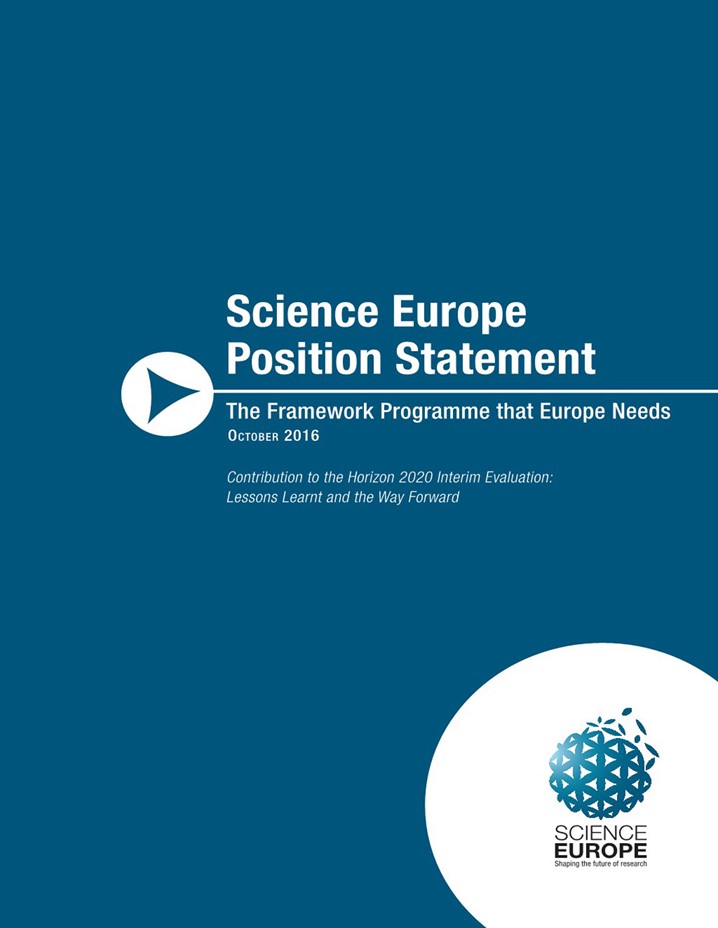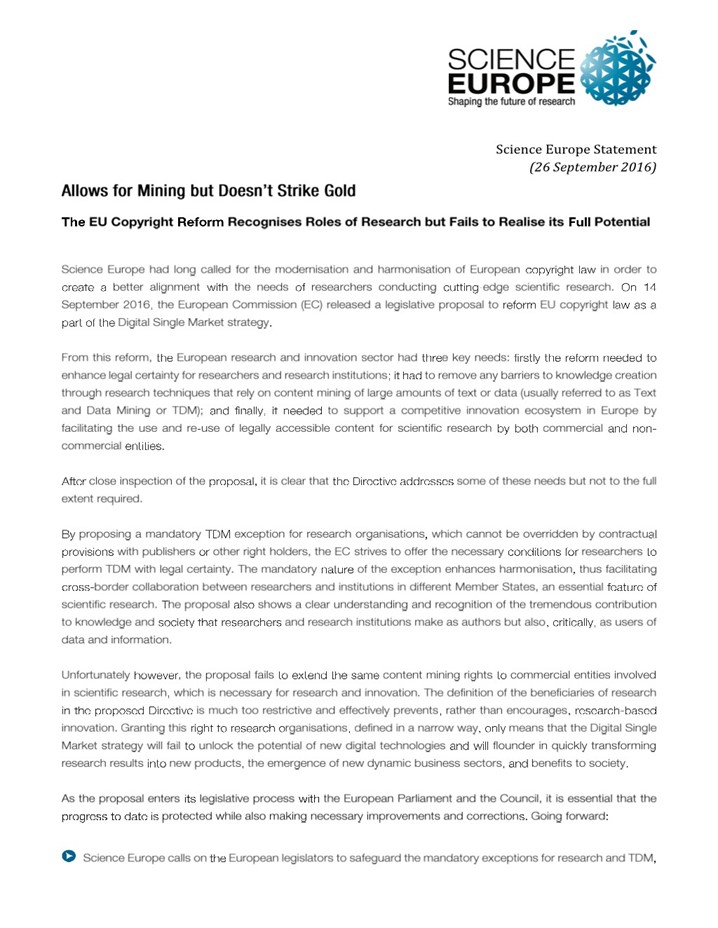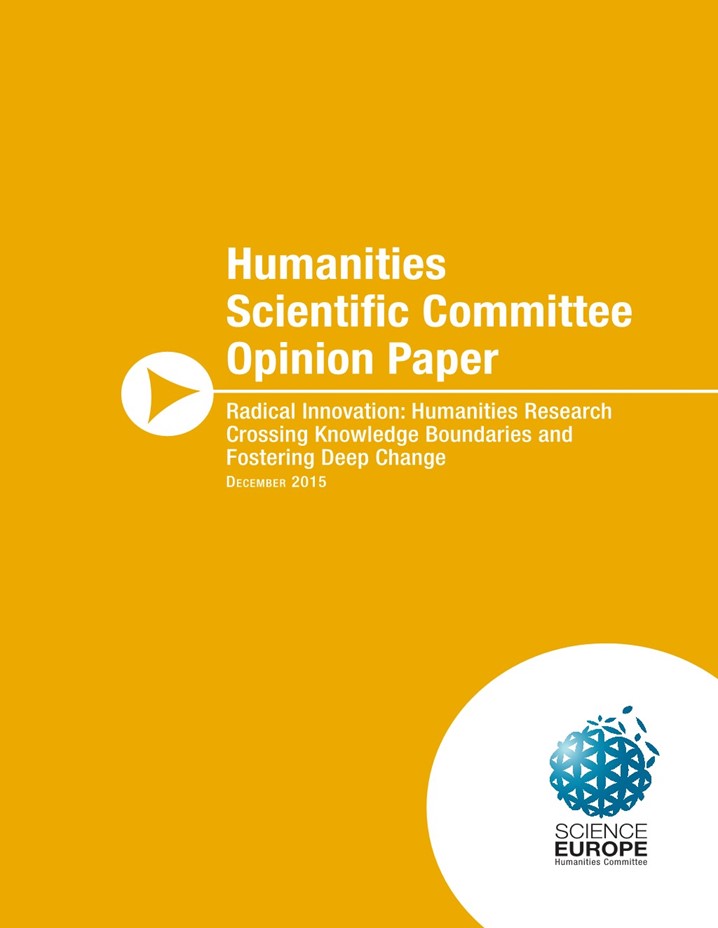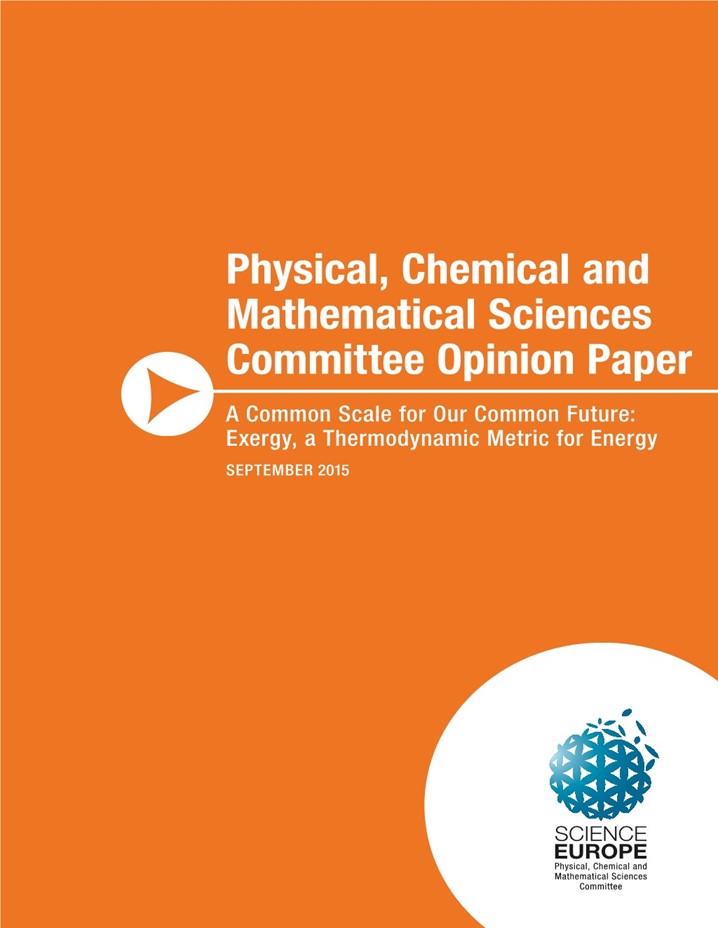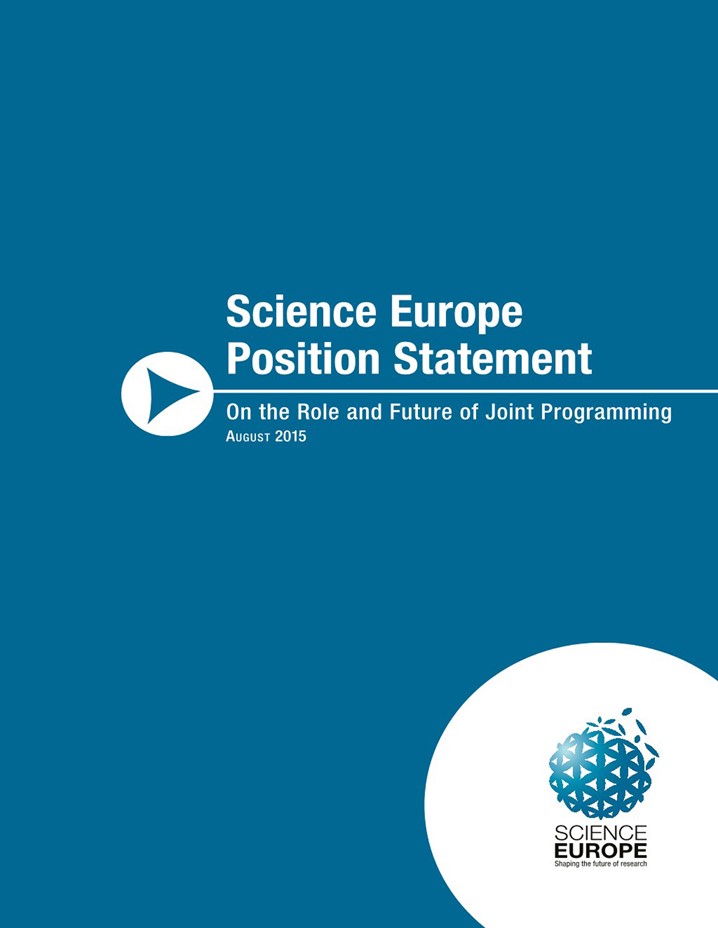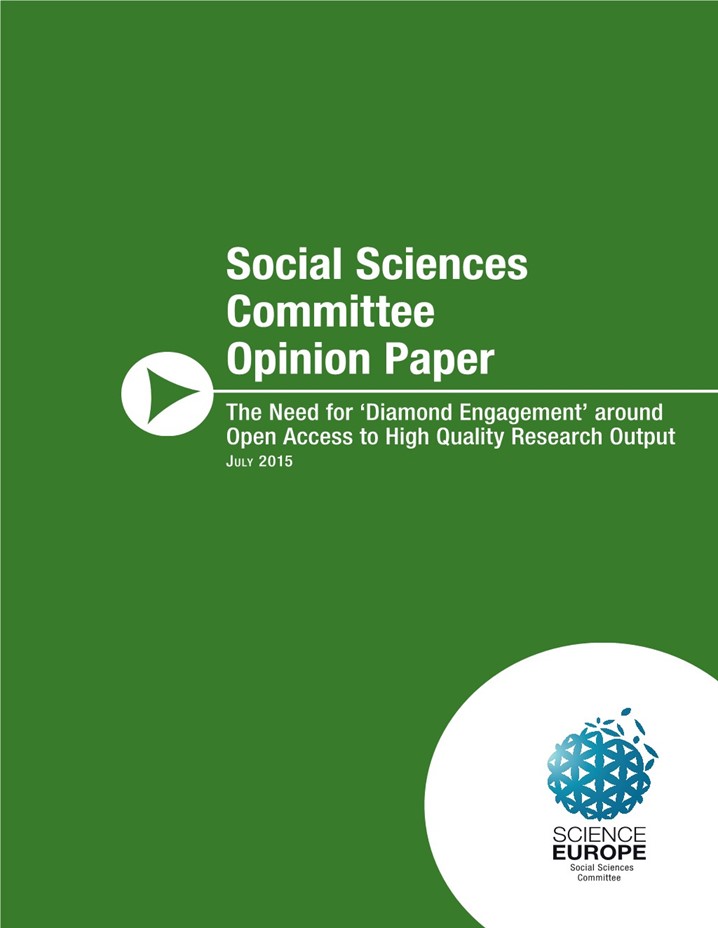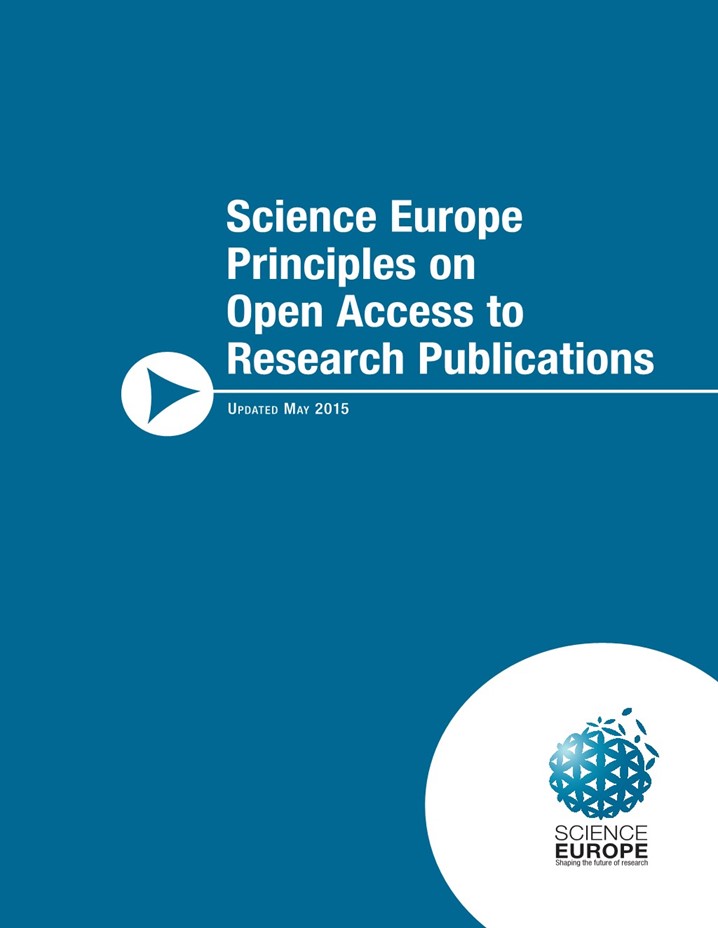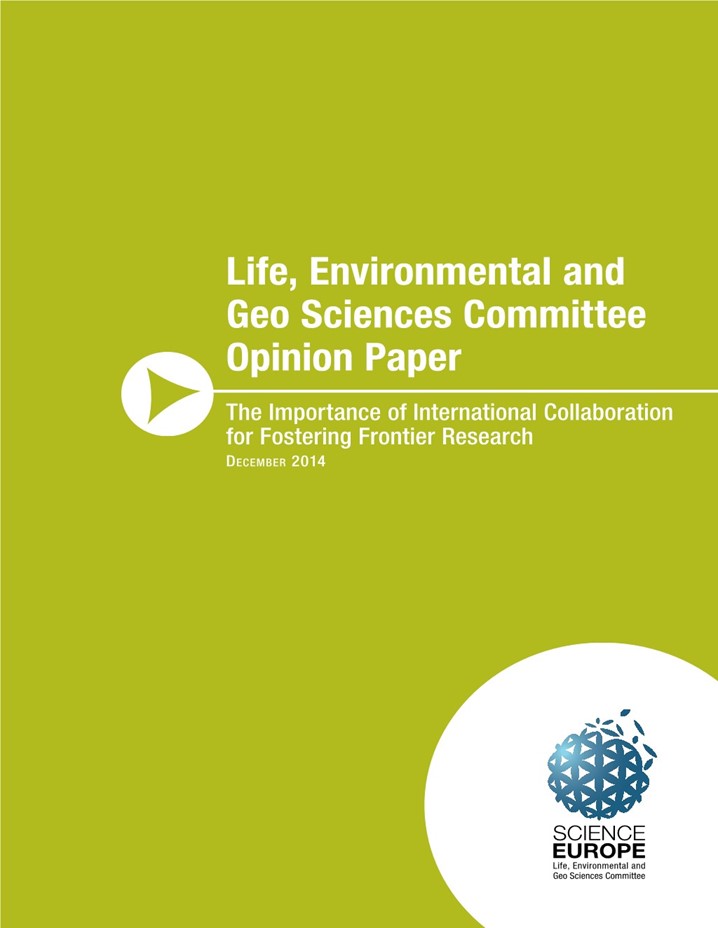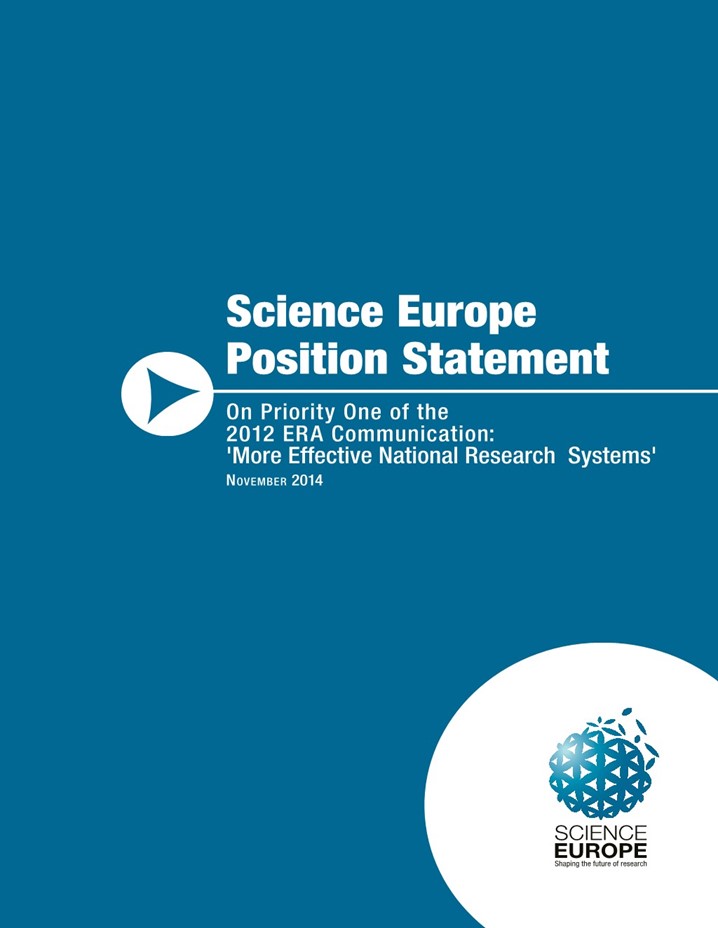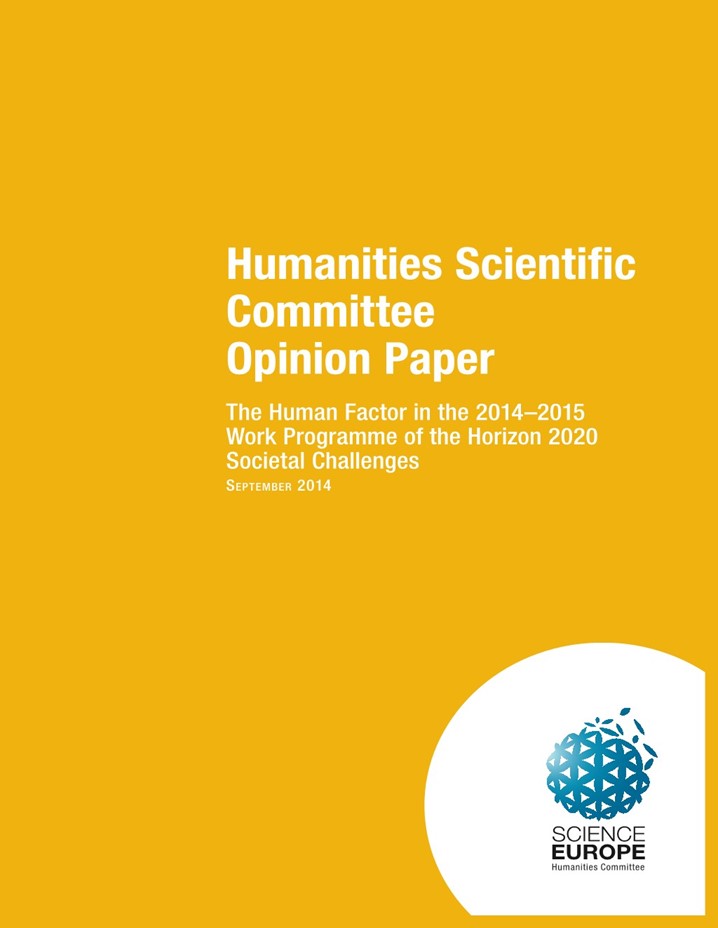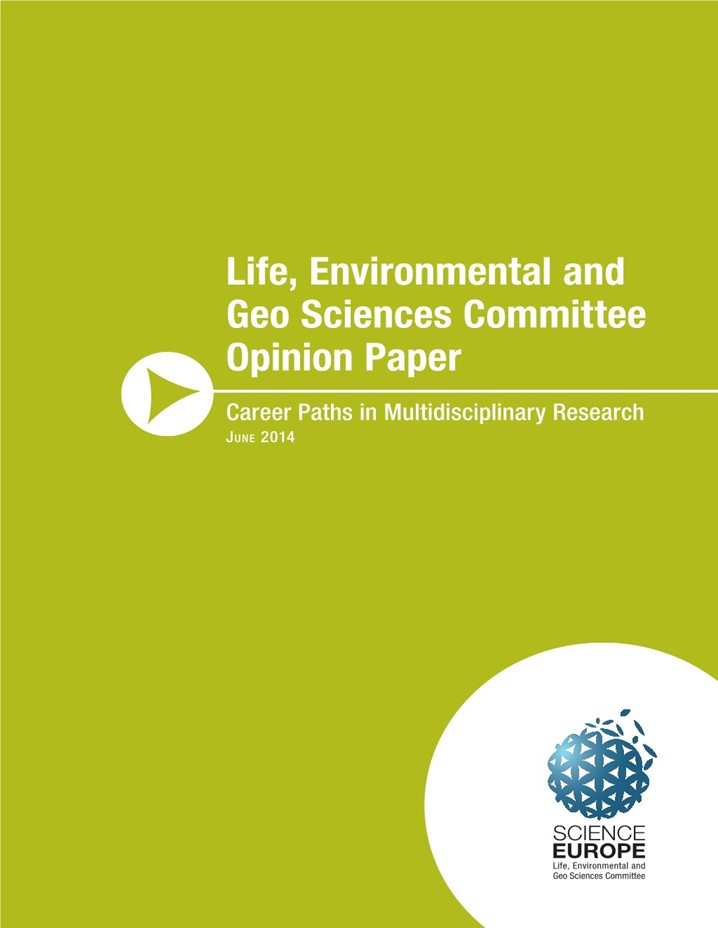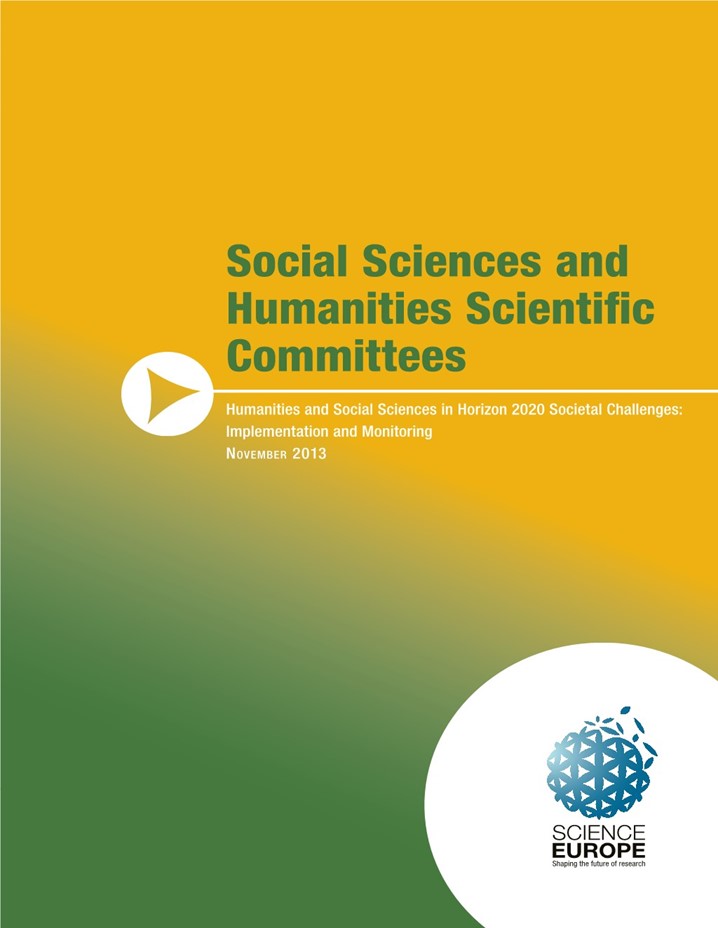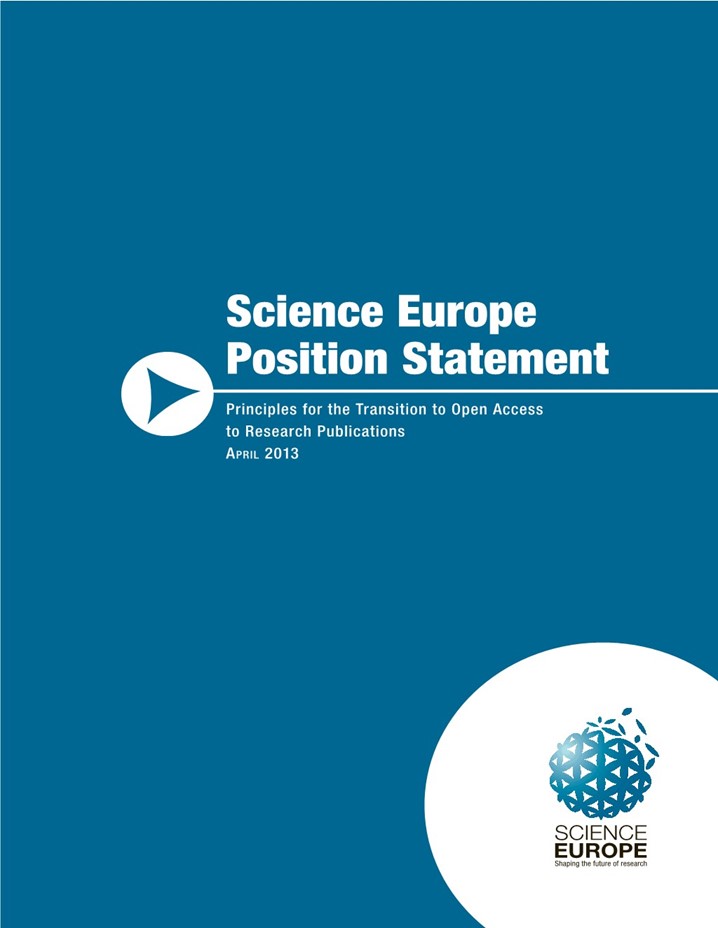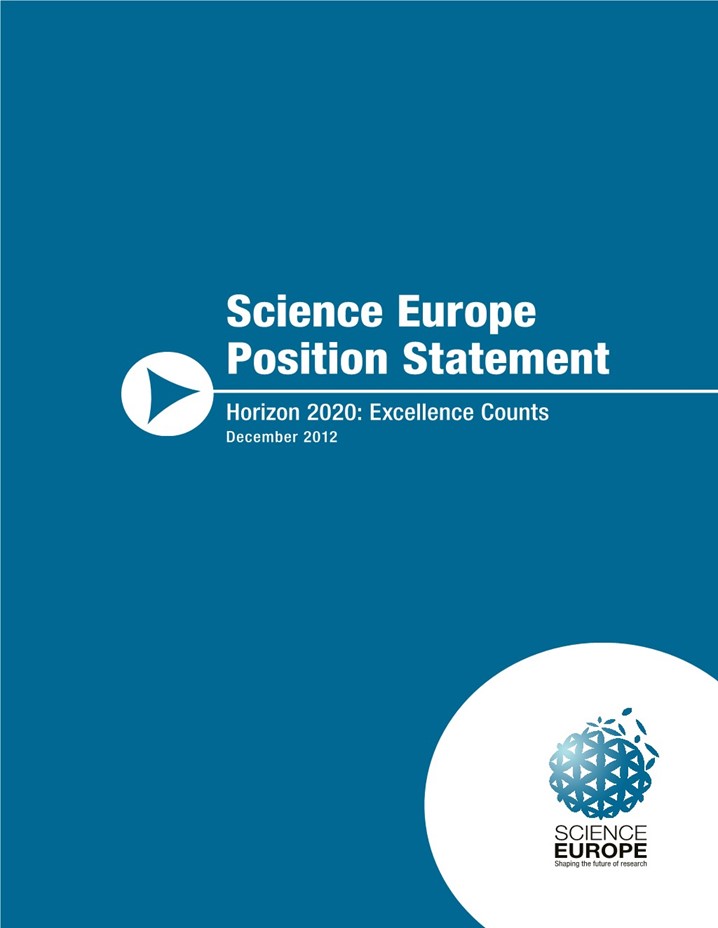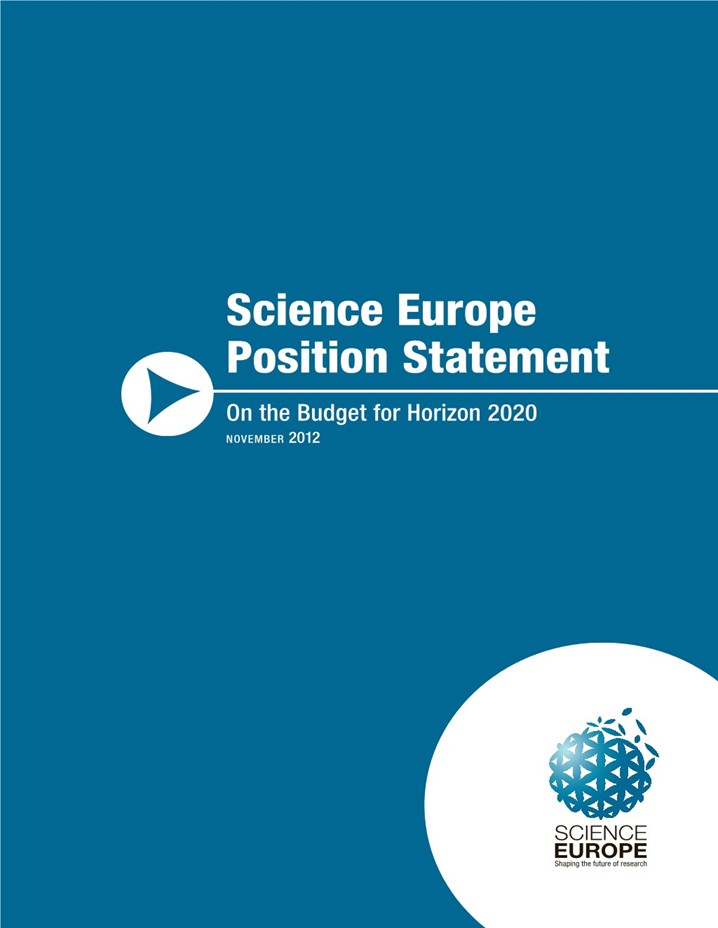Member-only content is available on this page. Please log in to view this content.

Our resources
Discover Science Europe’s comprehensive library of resources, including the most recent publications, briefings, and position statements.
45 resource(s) found
Position Statement on a New Vision for More Meaningful Research Impact Assessment
Science Europe advocates using the notion of ‘value’ of research. This is wider than ‘impact’ and reflects the intrinsic value of scientific research and its capacity to generate new knowledge. This statement provides a series of key principles and actions for policy makers and research organisations to help bring forward a new vision of impact assessment.
Science Europe Recommendation for the Disclosure of Publication Fees
Science Europe is committed to playing a role in accomplishing the transition to Open Access in an efficient and sustainable way and encourages scientific institutions to disclose payments of Open Access publication fees by participating in the ‘Open APC Initiative.’ This paper highlights how this will help create a more transparent cost structure in the Open Access publication market and stimulate competition.
Position Statement on Research Information Systems
Science Europe is working to enhance the interoperability of research information systems. This publication sets out common principles to guide their development.
Position Statement on the Framework Programme that Europe Needs
Horizon 2020 is a unique programme worldwide; it is widely appreciated and has an ambitious agenda. It can meet expectations as long as its nature as a programme capable of supporting excellent research is reinforced. Ahead of the interim evaluation of Horizon 2020, Science Europe shares the extensive experience of its Member Organisations, many of whom have decades of experience in setting up world-leading research programmes or are among the main beneficiaries of the Framework Programmes.
Allows for Mining but Doesn't Strike Gold: Science Europe Copyright Statement
The recent legislative proposal from the European Commission to reform EU copyright law addresses some needs, but not to the full extent required. Science Europe calls for research and data mining exceptions to ensure that copyright legislation is friendly to research and innovation.
Radical Innovation: Humanities Research Crossing Knowledge Boundaries and Fostering Deep Change
This Opinion Paper shows how arts and humanities research is at the heart of innovation processes. In this paper the Science Europe Scientific Committee for the Humanities advocates the need for a wider and deeper understanding of the concept of innovation, in order to better prepare Europe to tackle global challenges. The Committee points out ways to achieve stronger European leadership through the promotion of radical innovation by highlighting the contribution of arts and humanities research.
A Common Scale for Our Common Future: Exergy, a Thermodynamic Metric for Energy
A major challenge in striving for energy efficiency is the selection of technological systems, particularly given the need to consider multiple environmental, economic and social concerns. In addition, the general public, policy makers and experts alike misunderstand the physical nature of energy and hence its efficient use. After decades of fragmented agreements, regulations, treaties, strategies, indicators, targets, directives and communications, the European Union (EU) in its Energy Union strategy needs to take the lead in restoring the energy debate to firm foundations: those of thermodynamics, the science of energy.
Position Statement on the Role and Future of Joint Programming
This position statement highlights the added value of Joint Programming Initiatives (JPIs) as perceived by Science Europe Member Organisations, and makes two recommendations on the future of joint programming: one with regards to the evaluation of JPIs, and a second one concerning their governance. The aim is to stimulate other stakeholders – including the European Commission – to join in this discussion.
Opinion Paper on the Need for ‘Diamond Engagement’ around Open Access to High Quality Research Output
This publication by Science Europe’s Scientific Committee for the Social Sciences addresses two audiences: scientists, especially those who have been traditionally more resistant to the OA approach, and policy makers. In it, the Scientific Committee for Social Sciences proposes a ‘Diamond Engagement’ concept with the three key principles: partnership; standardisation and interoperability; and enabling structures.
Principles on Open Access to Research Publications
Open Access, as defined in the Berlin Declaration, means unrestricted, online access to peer-reviewed, scholarly research papers for reading and productive re-use, not impeded by any financial, organisational, legal or technical barriers. Ideally, the only restriction on use is an obligation to attribute the work to the author. Science Europe Member Organisation are committed to a shared set of principles on Open Access to ensure consistency and coherence in their efforts and activities.
The Importance of International Collaboration for Fostering Frontier Research
In this paper produced by the Scientific Committee for the Life, Environmental and Geo Sciences, the Committee argues that in order to strengthen international collaborative research, the national research funding organisations should consider increasing their efforts to widen the participation of various European countries and global partners in multilateral schemes, whilst fostering interdisciplinarity and knowledge integration. Moreover, a bottom-up approach should be adopted in order to collect research proposals that contain novel ideas and solutions, captured directly from the research community and users, thus enabling open innovation.
Position Statement on Priority One of the 2012 ERA Communication: 'More Effective National Research Systems'
The 2012 Communication ‘A Reinforced European Research Area Partnership for Excellence and Growth’ laid out the current approach for realising a European Research Area (ERA). As this approach is now being reviewed by the European institutions, Science Europe puts forward its analysis of Priority One of the Communication, in order to start a fruitful dialogue with the European institutions on the future of ERA policy. This analysis provides a practical example as to why the current ERA Communication approach needs to be thoroughly reviewed if ERA policy is to have a real impact.
Opinion Paper on the Human Factor in the 2014–2015 Work Programme of the Horizon 2020 Societal Challenges
Since its inauguration in early 2013, the Science Europe Scientific Committee for the Humanities has strongly supported Horizon 2020’s third pillar, Societal Challenges. The Committee realises the importance of the issues addressed, and the urgent need to find solutions to these pressing questions. The Committee is therefore committed to making the Challenges-approach successful.
Career Paths in Multidisciplinary Research
In this paper, produced by the Scientific Committee for the Life, Environmental and Geo Sciences, the Committee highlights the lack of clear evaluation metrics for scientists working in multidisciplinary teams. The Committee devises also concrete recommendations to contribute to the elaboration of an appropriate evaluation framework and suggests four main categories of indicators that demonstrate success in multidisciplinary and collaborative research: data generation, analysis and knowledge management; the development of enabling tools for data handling; the added value of collaborative research, and acknowledging contributions in bibliometic analysis.
Humanities and Social Sciences in Horizon 2020 Societal Challenges: Implementation and Monitoring
This Opinion Paper has been produced by Science Europe Scientific Committees for the Humanities and the Social Sciences to outline the main prerequisites for the successful integration of Social Sciences and Humanities throughout Horizon 2020’s Societal Challenges and across the entire research ‘ecology’. Overall, these elements should ensure a coherent interplay between the high-level objectives of Horizon 2020, the programme design, its implementation and evaluation.
Position Statement on the Proposed European General Data Protection Regulation
The European Institutions are currently entering the crucial stage of the legislative process that will revise the EU Data Protection Directive and lead to the European General Data Protection Regulation (DPR). Scientific research produces high impact results, depending heavily on access to and use of datasets that include personal data. In order to continue to perform scientific research for the benefit of Europe and its citizens, researchers need an appropriate DPR that reconciles the safe processing of personal data for scientific research and the protection of individual rights to privacy
Principles for the Transition to Open Access to Research Publications
Science Europe Member Organisations are committed to ensuring that publicly-funded research and innovation in Europe has the maximum impact, leading to new discoveries, and providing solutions that deliver societal benefit. Research publications are one of the main results of the research process and the Research Performing and Research Funding Organisations that comprise Science Europe share the vision of increasing the impact and reducing the costs of research publications by moving to a system of Open Access.
Embedding Social Sciences and Humanities in the Horizon 2020 Societal Challenges
European social sciences and humanities research is world leading in many areas. SSH research perspectives are key to tackling grand societal challenges in the future and its role throughout H2020 needs to be substantial. Simply stating such an ambition will not, however, result in its achievement. Here we provide some practical recommendations for how SSH can be embedded into the societal challenges in a meaningful and constructive way.
Horizon 2020: Excellence Counts
Producing excellent science and research has historically been Europe’s key asset for sustainable growth and maintenance of a leading position in a highly competitive global economy. Horizon 2020, the European Framework for Research and Innovation from 2014 to 2020, complements national and cross-border efforts and should strengthen the impact of investments into science, research and innovation.
Horizon 2020 Budget: Time for Europe to Commit to a Knowledge-based Economy
As European leaders meet to decide on the budget of the EU for the next seven years, the 50 major Research Performing and Research Funding Organisations that constitute Science Europe would like to stress the importance of adequate funding for research and innovation at the European level. The Europe 2020 strategy is the primary EU-level plan to strengthen growth and competitiveness, by producing clear European added value through investment in education, research and innovation.

